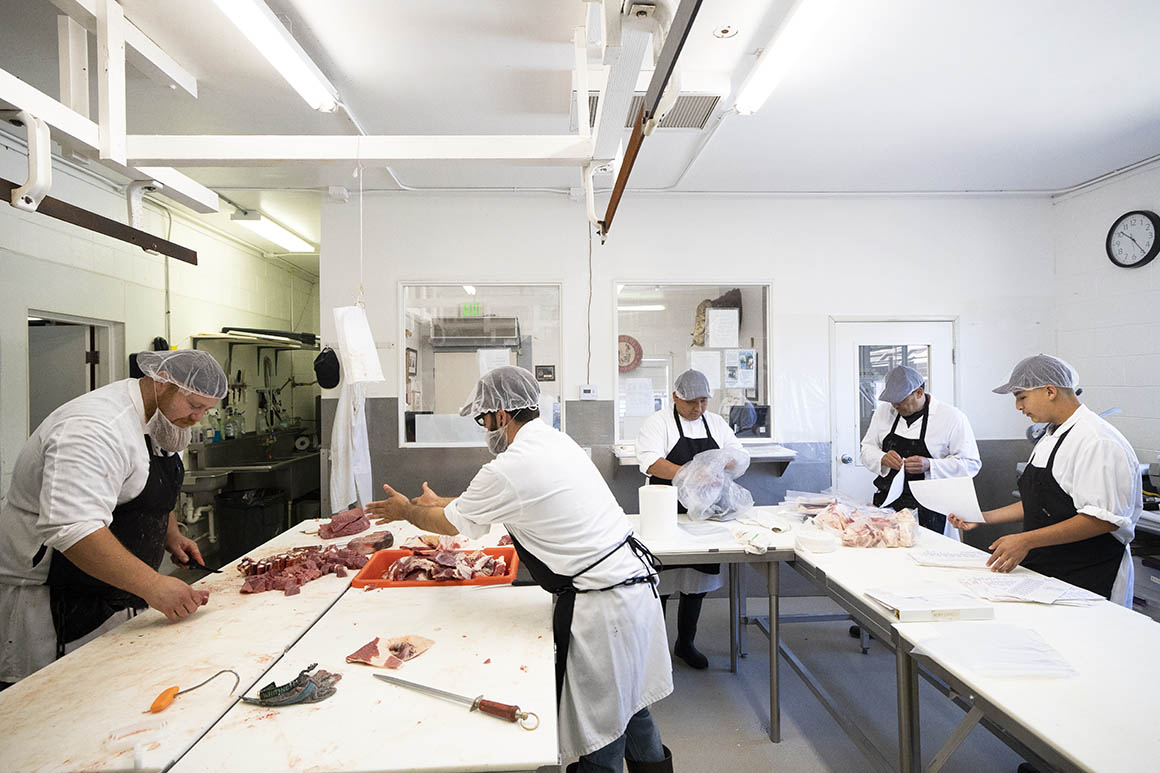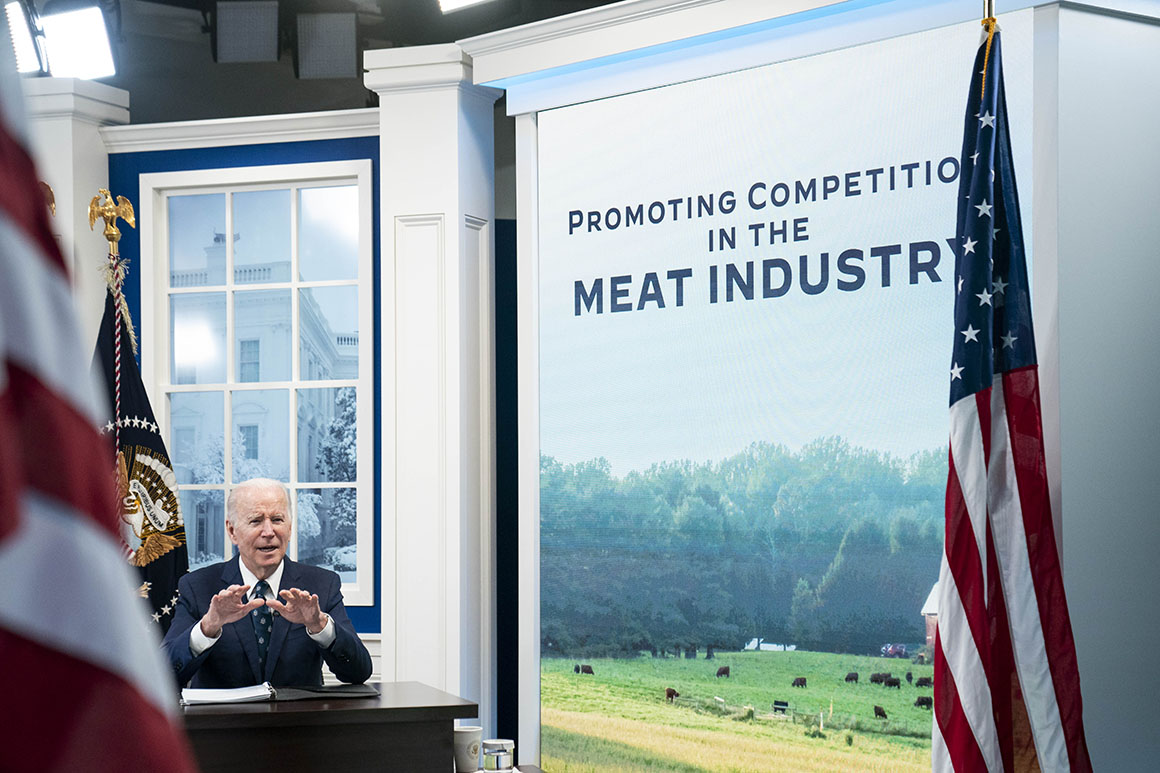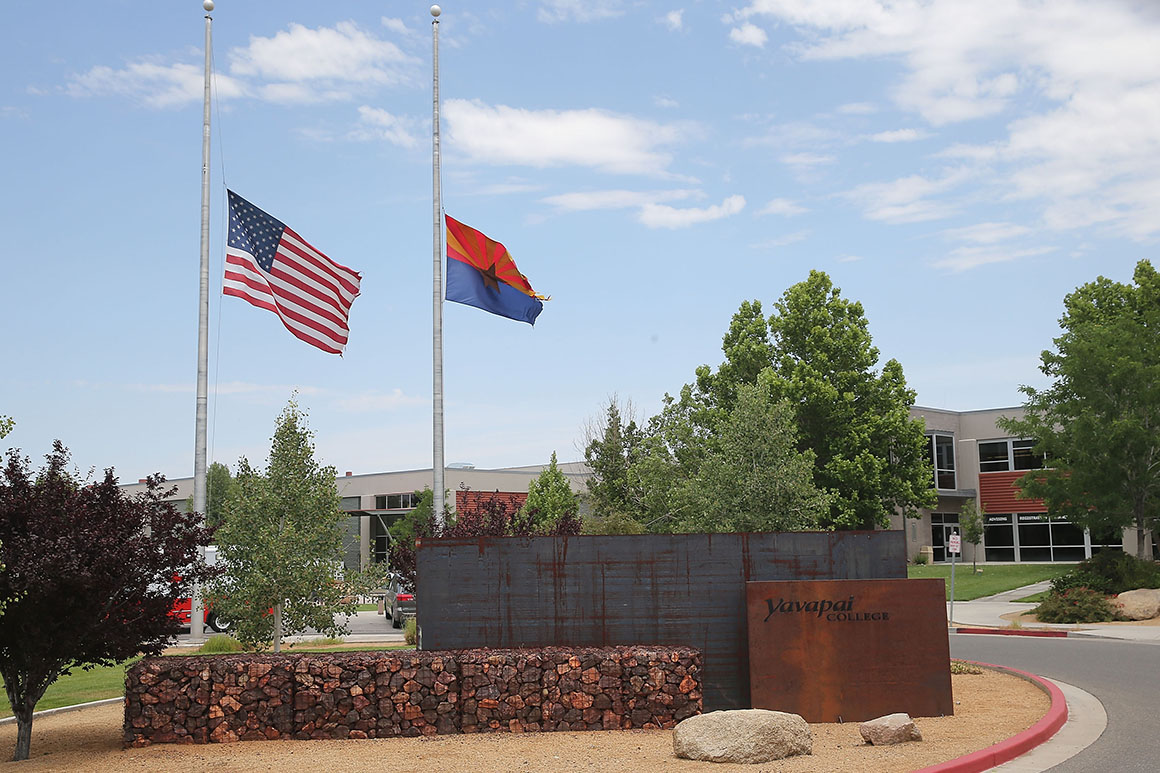
Yavapai College, situated amid the ranchlands of the Verde Valley in central Arizona, wants to start training local students to become butchers and meatpackers. The Biden administration wants to help.
The community college would develop a workforce so ranchers could send their meat to local packing plants instead of to the four giant companies that control 80 percent of meat processing nationwide. School officials are planning to apply for grants that President Joe Biden’s Agriculture Department is handing out in an effort to spur competition in the industry and promote sustainable local agriculture.
Training local workers would also help address longstanding agricultural labor shortages that have been exacerbated by years of stalemates over immigration reform in Washington. But the grant program will also test whether it’s even possible to convince a significant number of American students — especially those seeking college-level training — to commit to manual labor that’s now overwhelmingly performed by immigrants.
“What we expect are interesting partnerships with community colleges, junior colleges, land-grant universities helping to create that workforce,” Agriculture Secretary Tom Vilsack told POLITICO while on a recent trip to western states to promote the $1 billion from the American Rescue Plan that the administration is spending to promote competition in meatpacking. “You can probably train the processing side of this in a matter of months, but butchering takes probably years… and to do that, we need resources to be able to incent the community college to buy the processing equipment where young people can be trained.”

The Covid-19 pandemic supercharged the demand for small and regional packers as big plants shut down and ranchers had nowhere to sell their animals. At the same time, the Biden administration has accused the four big meatpacking companies — Tyson Foods, JBS, Cargill and National Beef — of inflating grocery store prices while keeping rancher profits low. The most recent food price index rose 6.3 percent between December 2020 and December 2021, with prices for beef up more than 19 percent and pork up nearly 15 percent, according to the USDA.
Supporters of the meatpackers, however, argue that the Biden administration is using them as a scapegoat and ignoring other causes of inflation.
Locals in the Verde Valley were thinking of starting a one-semester meat processing curriculum and certificate program even before the pandemic started, and the community college joined those conversations at the start of the pandemic. The University of Arizona helped obtain land two years ago but the school still needs funds to build a training facility.
Verde Valley community leaders including the Arizona Farm Bureau, city officials and individual farmers and ranchers are hoping to apply for some of the $100 million in grants set aside by the Biden administration to help build facilities or to purchase equipment for training.
“This is something the Verde Valley community has been asking for,” said Diane Ryan, vice president of academic affairs at Yavapai College. “Yavapai County is the size of the state of New Jersey and they are trying to establish themselves as an agricultural, home-grown region. There are a lot of ranchers that are here and they want a local place to process their meat.”
Ryan said she expects students will be interested. “This semester we have about 600 students on our Verde Valley campus and of those 76 percent are enrolled in career and technical programs,” she said.
Meat processing is not low-skilled work. Workers need to learn how to use multiple pieces of equipment, the anatomy of each animal and how to package and display meat all while following health and USDA guidelines. While butchering a carcass, harvesters take measurements and conduct analyses that are then later passed on to ranchers to inform their feeding and raising habits.
Still, some farmers and agriculture professors say they doubt large numbers of American students seeking college training will want to work as meatpackers or in other manual agricultural jobs. That labor market has been shifting for years toward foreign-born workers.

A 2020 report from the Economic Policy Institute found that nearly 40 percent of the animal slaughtering and processing workforce in the U.S. was foreign born and 70 percent of those workers were non-citizens. Meatpackers have increasingly relied on a limited number of immigrant worker visas over the last decade to staff their plants.
“I have never met anyone who has come up to me and said, I want my kids to change waters. That's what I want them to grow up to do is to irrigate. I want them to grow up to work on a ranch,” Stefanie Smallhouse, president of the Arizona Farm Bureau, told Vilsack during an Arizona producers roundtable last month. “It's just not an avenue of employment for Americans. We have very good workers. They come from other countries.”
Shane Burgess, vice president for the Division of Agriculture, Life and Veterinary Sciences, and Cooperative Extension at the University of Arizona, said it's great the administration is focusing on boosting agriculture and rural development, but job candidates with specialized degrees “are not the people the sector is struggling for.”
“When a job opens, our graduates end up getting jobs in that sector,” Burgess said. “More managerial roles, marketing, nutrition, food safety that require higher education.”
Many collegiate programs are currently geared toward helping students get into managerial and technology-focused careers.
“It's not just being someone out there who is just plowing the fields or something like that, those days are gone. It's tech now,” said Robert Taylor, dean of the College of Agricultural Sciences at Florida A&M University. “We definitely need to spend the money and develop programs that's going to increase productivity in agriculture.”
The Biden administration’s efforts come on top of existing local and state efforts to train the next generation of meatpacking workers.

At the University of Idaho, students focusing on meat sciences run their own USDA-inspected meat processing facility and then sell the products in local grocery stores. The school is in the final phases of raising funding for a new facility that will end up costing $8 million.
“The analogy, I say, is if you need to increase public transportation, you can't just build more buses. You also have to have somebody to drive them,” said Phillip Bass, assistant professor and meat scientist at the University of Idaho. “We need to be teaching more about where our food comes from, not just what to eat, but how we produce food. And then also maybe even encouraging and describing career paths earlier on."
The university works toward creating a labor pipeline for regional processing facilities that compete with the big four meatpackers.
Some states like Wisconsin are taking matters into their own hands, offering programs to train and recruit meatpacking workers.
The Montana Farmers Union is partnering with Montana State University-Northern to develop a meat processing curriculum but it will be $100,000 to $200,000 to get the program started. The goal is to start it this fall.
“The reality is, that's kind of a tough career path because those really small meat processors are really just a single-family-owned operation and there's not a lot of opportunity for advancement and sometimes the salaries are going to be pretty limited,” Bass said, adding that most students will go toward regional meatpackers like Boise-based Agri Beef which serves the Pacific Northwest.
But focusing on an educational pathway and funding opportunities for expansion in rural areas is likely a good investment, even if it's a long haul, he said.
“I believe that the universities can provide a lot of that training. Not that these are necessarily going to be the people running the knives every day,” Bass said. “But [that] can do that job and can help these companies continue to build solid teams of high quality workers who are going to help us do the job.”
----------------------------------------
By: Ximena Bustillo
Title: Why Biden wants more U.S. students to become butchers
Sourced From: www.politico.com/news/2022/02/08/meatpacking-students-agriculture-usda-00005427
Published Date: Tue, 08 Feb 2022 04:30:00 EST






